A good multimeter is like the Swiss Army knife of electronics tinkerers. It’s so useful you’ll rarely put it away, giving it a permanent spot on your desk. Between testing old components, measuring voltages and checking the continuity of circuits, you’ll be reaching for it all the time. But there are many other applications in a ‘meter, so it’s important to get a good one.
On one hand, you can get a $9 model that takes care of the basics, but does it sport advanced features when your needs change? Conversely, you can spend $500 on a pro-grade multimeter but it may have tools you’ll never need in a hundred years, or packs precision only a professional requires. The trick is to find a unit in the middle of the range.
Recently I played around with the Extech EX470 multimeter:
Voltage & Current Testing
One of the most common applications. The EX470 is autoranging, which means that you don’t have to set it to a specific range before checking — for instance, 120 volts versus 12 volts. However, some experts prefer manual ranging meters because they feel it better matches fuses to specific voltages. However, DIYers would probably prefer autoranging because it simplifies the interface. Tinkerers may test current (amps) less often than voltage but it’s still important to have in a meter. The EX470 measures from 0.1mV to 750V AC and 0.1mV to 1,000V DC and up to 20A on current.
Continuity Testing
Along with measuring voltage, checking continuity is likely to be the most common use for the ‘meter. The EX470, like a lot of competing products, can test the continuity of a circuit by sending a tiny trickle of juice through the wire. The EX470 will sound a little beep letting you know you have continuity. If you don’t get that signal, check your wiring!
Component Testing
DIYers love to repurpose old electronic junk, and you’re definitely going to want to check these parts before you solder them in. The EX470, like a lot of higher-end ‘meters, checks inductors, capacitors, resistors and diodes.
Figuring out the ohms of one resistor is simple, just look the color bands. But what if you have a bunch stacked or for some reason you can’t see the bands, or don’t trust the component? Never hurts to check. The EX470 measures resistance from 0.1 to 40M ohms.
A diode keeps the juice flowing in the right direction to keep from frying delicate components. How many circuits have been messed up by having your diode pointing the wrong way or having a diode crap out at an inopportune time?
Inductors often are physically larger and baddies can be spotted visually. But some brave souls wind their own inductors and chokes and you’d definitely want to test it first if you go that route.
Frequency Counting
You mainly use a ‘meter’s frequency counting to check if the electricity is normal — in other words, within a reasonable distance of however many Hz you’re expecting. They’re also good for testing circuits that are supposed to have X number of RPMs or a certain frequency of switching something on and off. The frequencies the EX470 measure range from 0.001Hz to 10MHz.
Conclusion
What I like about the Extech EX470 is it has all the frills like auto ranging, auto off after 15 minutes of inactivity, and stuff that you might never use (like inductance testing) that you nevertheless want to have as an option. The EX470 has all that stuff, plus it has one awesome feature that — for the most part — Extech multimeters have: infrared temperature testing.
The EX470 has an IR emitter on top that will measure the temperature of a surface you either can’t reach or might not be safe to touch. While not as precise as a Type K temperature probe (which the EX470 also packs) it’s sometimes useful to not have to touch the surface. Plus, it comes with a laser pointer next to the IR emitter so you can aim it precisely. (I found only one other multimeter with IR temperature sensing. An Omega, it cost about twice as much.)
There are so many features that I haven’t covered — for instance, if you have the probes plugged into the wrong sockets the unit will buzz loudly to let you know. This ‘meter is an awesome DIYer’s tool — it’s easy to learn how to use, has the features you need and a level of precision more than adequate for tinkering.
WIRED: Packs all the features most DIYers need, and then some. Its non-contact IR temperature sensor is a rarity among multimeters.
TIRED: $140 price tag makes you think twice about passing by cheaper (though more feature-light) alternatives.
(By the way, if price is a concern, Extech is currently offering a rebate. Between now and the end of June you can get up to $200 back on Extech stuff.)




